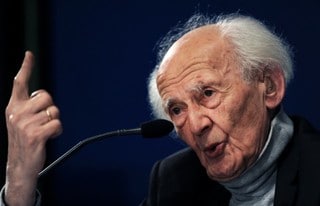
Urban legend among sociologists has it that in his latter years, Bauman used to spend his mornings writing and the rest of the day watching Jeremy Kyle and the like. He was immersed in everyday television culture, but only as a spectator ultimately cut off from it. This was nothing new. As an immigrant, having been exiled by the Stalinists during an anti-semitic purge of Polish society in the late 60s, he self-consciously had something of the outsider to his observations of what was going on in Britain and the West. This immediately came to mind when I read the small passage below. It's not a profound insight by any means, but is something anyone who writes on politics and current affairs who is a) not in London, and b) not tied to the Westminster apparatus, can relate to.
Writing on why Scotland was the centre of social thought and political economy scholarship in Britain in the late 18th century, Bauman noted:
The tendencies at full swing in the 'centre' are, as a rule, most promptly spotted and most clearly articulated in places temporarily relegated to the 'fringes'. Living at the outskirts of a civilisational centre means being near enough to see things clearly and yet far enough to 'objectify' them and so to mould and condense the perceptions into concepts. (p.141)Marx would be a fitting case in point. A refugee from Germany whose life was one of grinding poverty, albeit alleviated by the occasional cheque from Engels, and for whom daily life was bounded by a devoted family, trips to the British library, and the petty intrigues of exile politics, this man who was very much on the outside of the first industrial nation was able to produce the most accurate picture of its dynamism and tendencies, most of which still stand up.
I digress. In the age of social media, of feeds from multiple sources pumping information into the brain, and of always being switched on, don't be surprised if the most penetrating diagnoses of our condition come from brains sat at some remove from it.
2 comments:
Misread headline as "Batman on Being Outside"; resulting article was inevitable disappointment. Who better to comment on centres and fringes of society than Bruce Wayne?
Like Stoke? I remember trying to read the liquid book years ago but it may have been a bit much for me. I read the autobiography by his wife, however, which left a deep impression - it was a record of her time sheltering from the Nazis. I'll never forget te scene close to the end when a young woman she had been in hiding with for years steps out into the street when they believe the Nazis had left, despite admonitions to stay inside, only to be picked up minutes later and never seen again.
Post a Comment